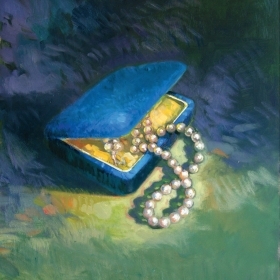I was 46 when I had my one and only child, and people lost no time pinning qualifying adjectives upon my incipient momhood—ancient, old, venerable, mature—seven months before her birth.
It grated because I felt the opposite: young, vigorous, ripe, youthful—words that better described a woman pregnant for the first time, and not, as I’d initially thought, one entering menopause.
I had no trouble rejecting my first obstetrician’s “ancient” label—my mother had her last child at 40, and my husband’s mother had hers at 44. In my mind, the numbers simply meant that our family produced babies later than most, and that life—mine, at least—rarely went according to plan.
I never expected to be divorced at 27 and remarried at 38, nor to have my new husband shot and nearly killed weeks after our wedding. I never imagined his recuperation would take years, nor, once we decided to have a baby, that falling pregnant would take no time at all. I never dreamed I’d need a second obstetrician known for his surgical technique, nor the C-section both doctors decreed as required from Day One.
I was too busy enjoying my pregnancy, whose textbook-perfect nature seemed to shock everybody but me. I chalked it up to luck, good genes, healthy food, years of competitive swimming, and our car-free state in Rome. No car meant I’d walked everywhere, every day, for years, happily dragging home groceries in a two-wheeled “old lady” shopping cart, which apparently did wonders for my heart and general health.
I felt happy (and rejuvenated) two years later when we moved to Paris, even if it meant tackling a new language at 48 and trying to find ways to ease our daughter out of baby Italian and into baby French, so she wouldn’t be utterly lost when she started school at 3. Later, though it was clear I was 10 to 20 years older than the mothers of Julia’s classmates, she reminds me that we were considered “exotic,” not for our age, but for being American.
Still, if you have your first child at 46, and she takes two years off in high school to pursue full-time ballet training, then consciously ditches that dream to resume academic studies, you might find yourself submerged in the horrors of college applications rather than enjoying retirement at age 65.
Julia’s plunge into the college scramble marked the one and only time I felt light years too old to be the mother of my child. I’d made my lone college application 44 years earlier, completing Wellesley’s forms with a ballpoint. When my acceptance letter arrived in early December, I was in, without having broken a sweat.
Though I lived in Europe for more than 30 years after graduation, I knew that the sweat-free college application process I’d enjoyed had long ago morphed into a cutthroat, strategic battle for admission. Julia had top grades and recommendations, but her American standardized test scores didn’t begin to reflect her skills. Fifteen years of French schooling meant she could express herself verbally and on paper in flawless French, but that she felt blocked and clumsy trying to produce similar essays in English.
She thought she’d be able to write her essays before senior year began, but that summer she was still processing her decision to stop training with the Joffrey Ballet and leave the dance world, which had filled her life since she was 3. During her October vacation, she was still finalizing school choices, utterly unable to put pencil to paper. Clocks ticking, her main essay finally erupted over Thanksgiving in a 45-minute torrent of writing. The logjam broken, her confidence grew, and she filed nine applications by mid-December; she didn’t look back.
Neither did I. At 67, I feel just the right age to be the mother of a 21-year-old first-year student, now lapping up art history, Greek literature, linguistics, and Italian; expecting to graduate a year early; already making plans for a master’s somewhere in Europe. Julia still may be taking class notes in French, but she’s no longer panicked at the thought of writing in English.
We went to see Lady Bird recently, the two of us a real mother and daughter in an easy, loving relationship parsing the fraught, loving relationship of a film mother and daughter working through the hell of college applications. We gave the film five stars. We gave ourselves five more, for getting through it in real life. Unlike the film, in real life nobody hurled themselves from a moving car.
Paula Butturini ’73 is a former foreign correspondent for the Chicago Tribune and United Press International, and a longtime former contributor to the New York Times travel section. Her book, Keeping the Feast, is a memoir about injury and healing told through food.








We ask that those who engage in Wellesley magazine's online community act with honesty, integrity, and respect. (Remember the honor code, alums?) We reserve the right to remove comments by impersonators or comments that are not civil and relevant to the subject at hand. By posting here, you are permitting Wellesley magazine to edit and republish your comment in all media. Please remember that all posts are public.